Abstract
In communities with endemic blinding trachoma, mass (or ”blanket”) treatment with a topically applied tetracycline derivative is a standard control measure. The widely used ”intermittent” treatment schedule consists of the twice daily application of antibiotic ointment for five consecutive days once a month for six months. In this study, the efficacy of ”intermittent” treatment was evaluated for the treatment of severe and moderate intensity trachoma in children in southern Tunisia. Tetracycline or erythromycin ointments (specific antichlamydial drugs) were compared with 5% boric acid ointment (a simple antiseptic) given by the intermittent schedule during the winter and spring. There was a statistically significant degree of improvement at only one examination, four weeks after the full course of treatment had been completed. When re-examined five months later there were no differences in intensity in the three groups. The limited effect of topical chemotherapy might be attributable to several causes, among which could be inadequate drug levels, inadequate treatment periods, reinfection from non-treated children in the community, and auto-infection from extraocular sites (e.g., respiratory tract) in the same child. The possible value of short-term (two weeks) systemic antimicrobial therapy as an additional strategy to prevent blindness of children with potentially blinding active trachoma is discussed.
Full text
PDF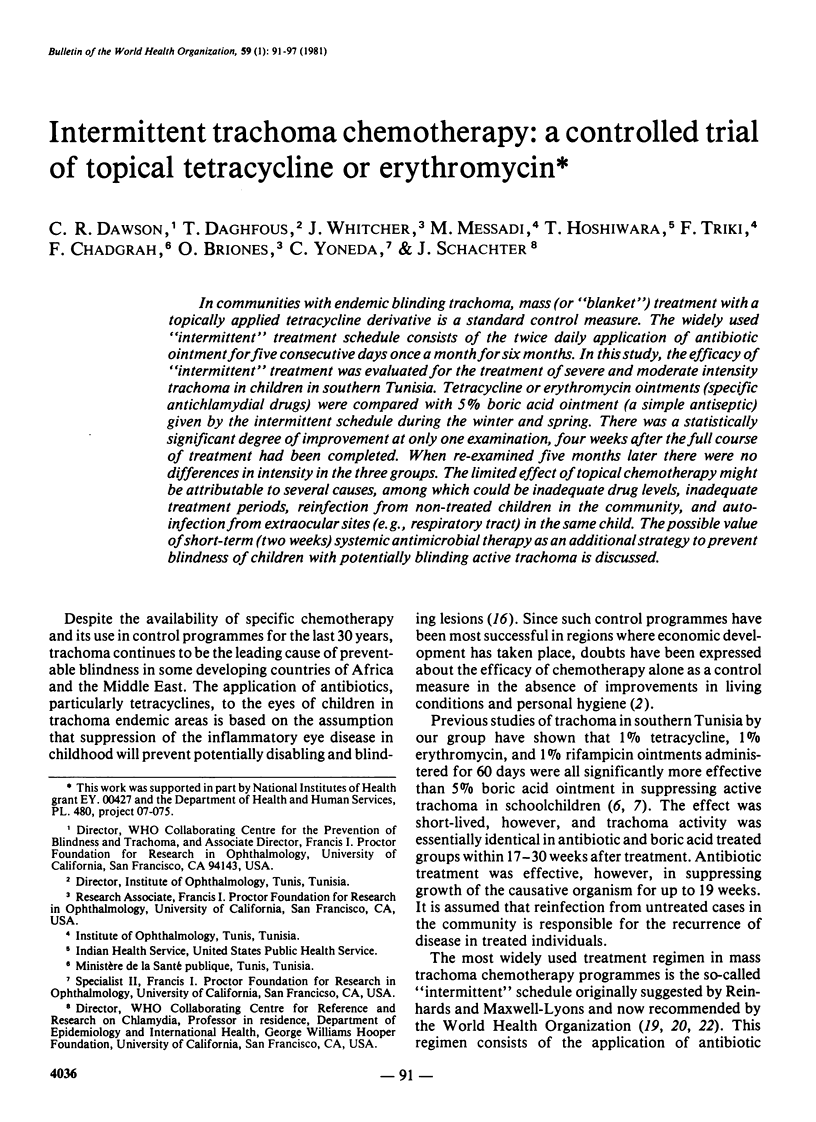
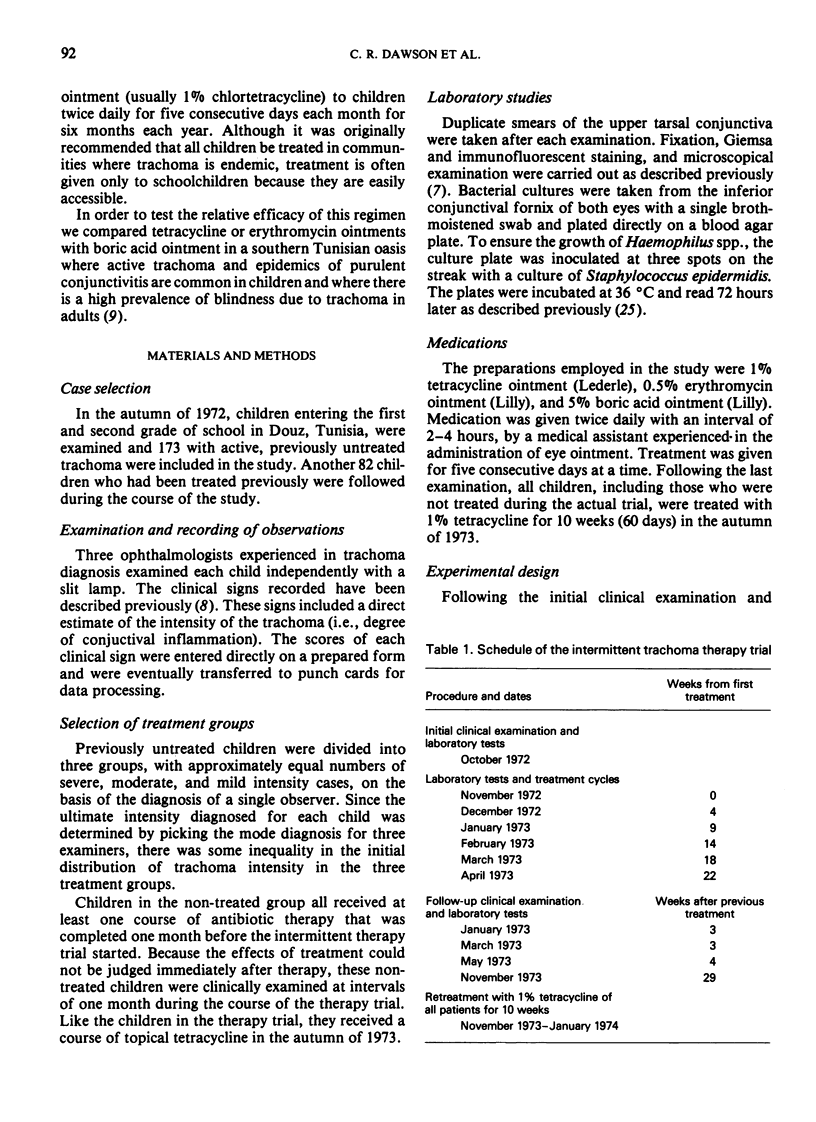
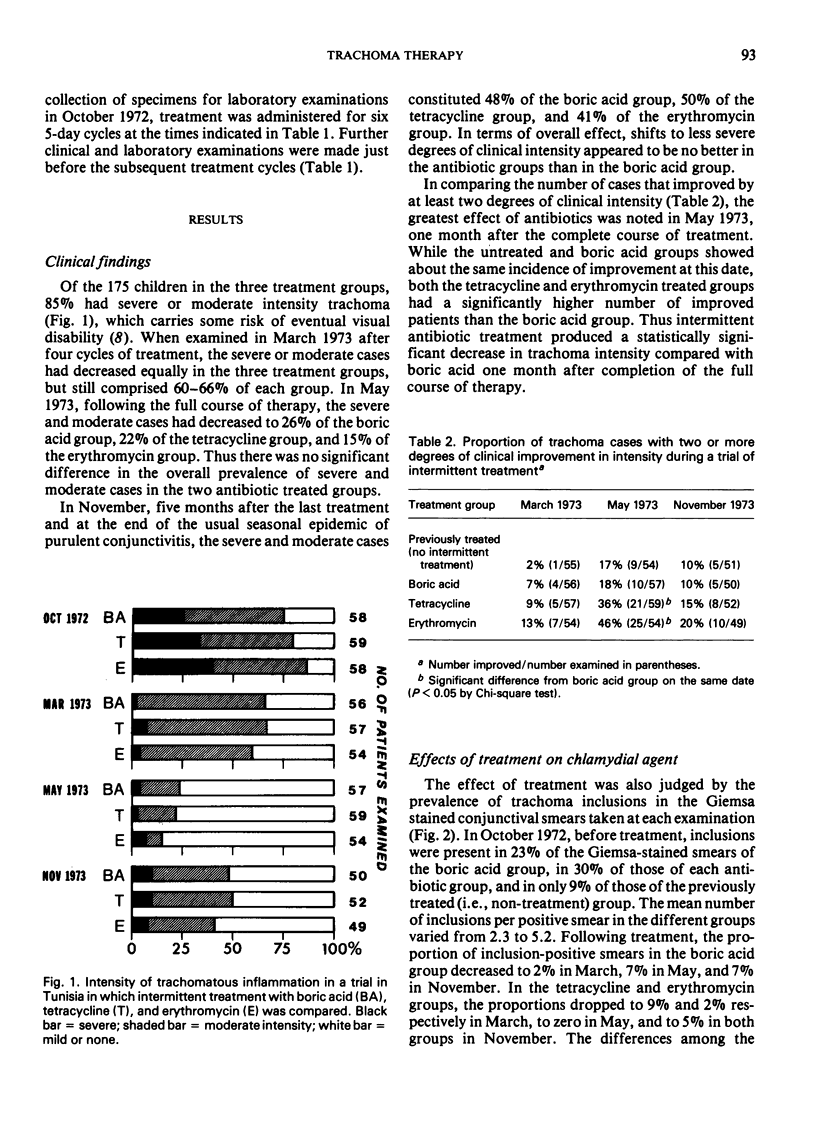
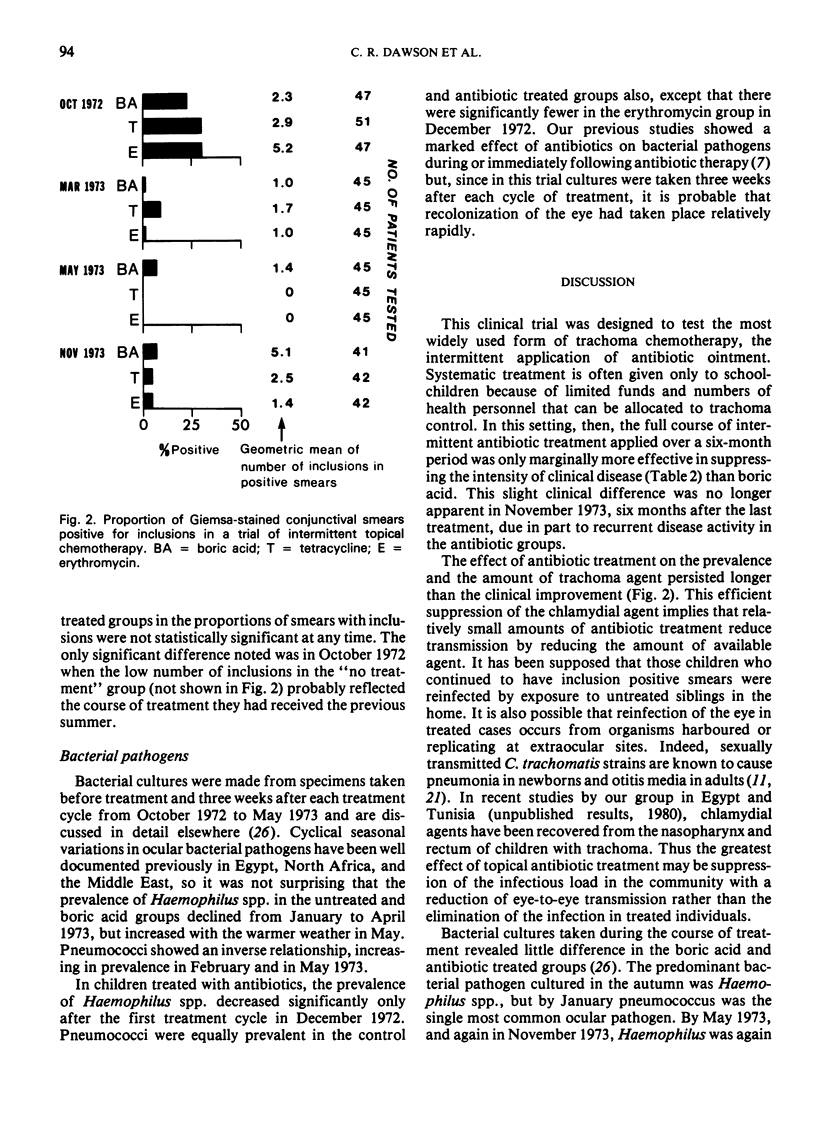
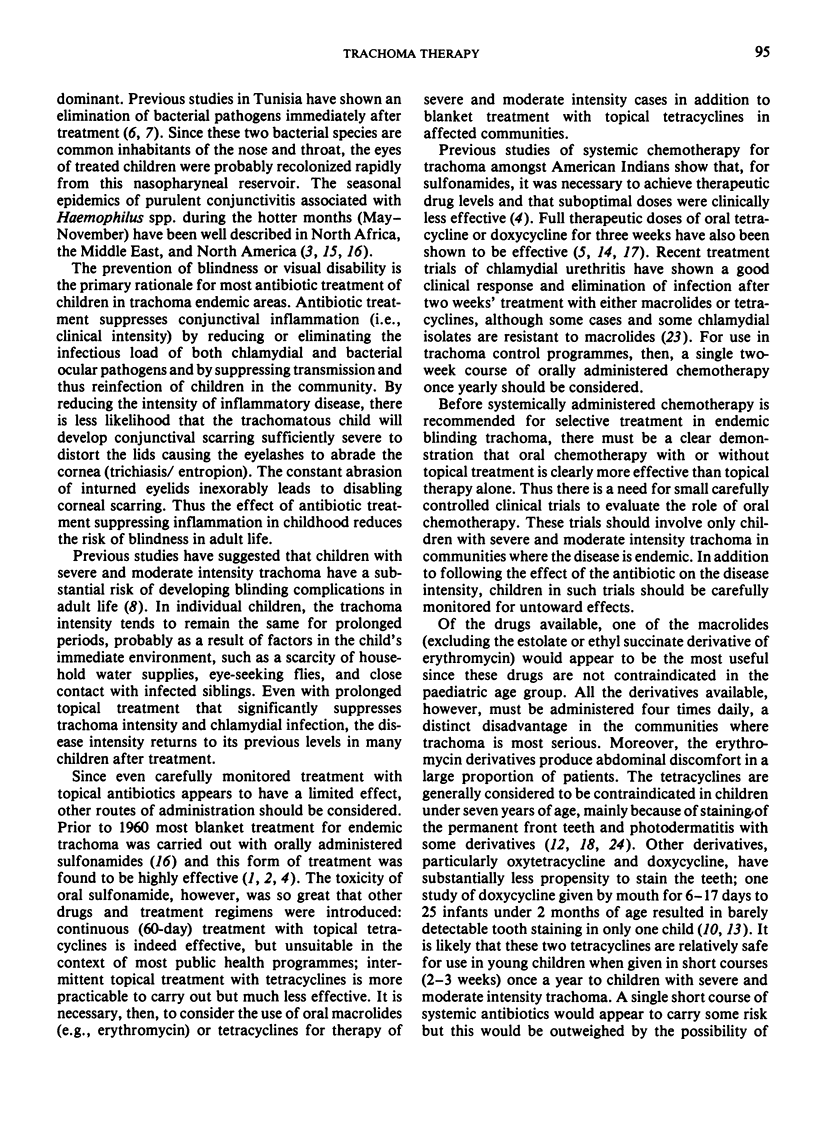
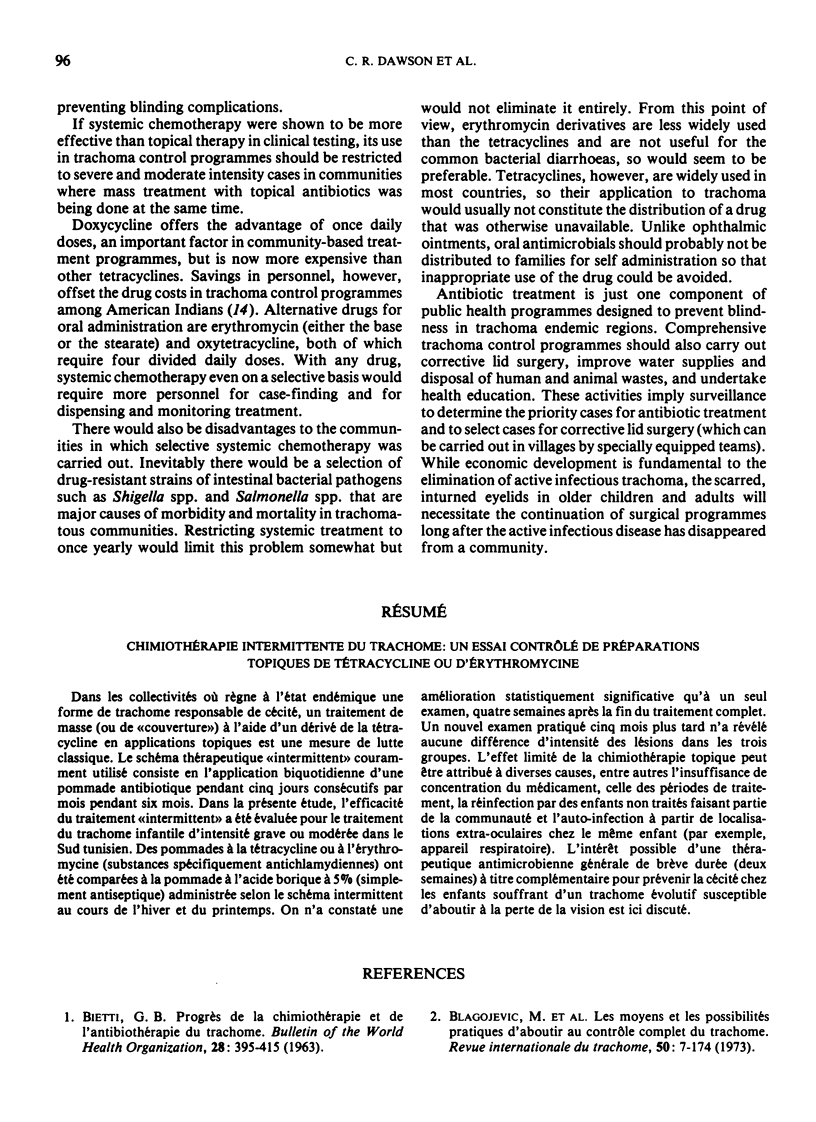
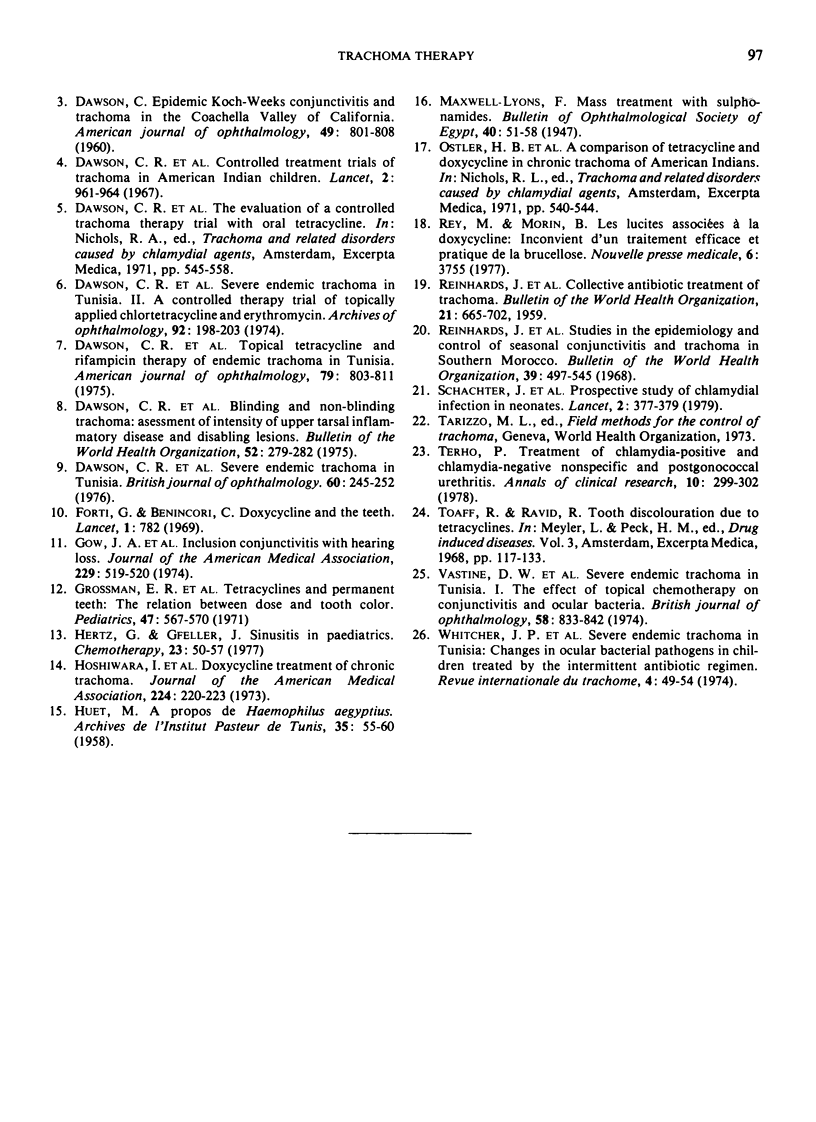
Selected References
These references are in PubMed. This may not be the complete list of references from this article.
- Blagojević M., Savić D., Litricin O. Les moyens et les possibilités pratiques d'aboutir au controle complet du trachome. Rev Int Trach. 1973 May;50(1):1–174. [PubMed] [Google Scholar]
- DAWSON C. R. Epidemic Koch-Weeks conjunctivitis and trachoma in the Coachella Valley of California. Am J Ophthalmol. 1960 Apr;49:801–808. [PubMed] [Google Scholar]
- Dawson C. R., Daghfous T., Messadi M., Hoshiwara I., Schachter J. Severe endemic trachoma in Tunisia. Br J Ophthalmol. 1976 Apr;60(4):245–252. doi: 10.1136/bjo.60.4.245. [DOI] [PMC free article] [PubMed] [Google Scholar]
- Dawson C. R., Daghfous T., Messadi M., Hoshiwara I., Vastine D. W., Yoneda C., Schacter J. Severe endemic trachoma in tunisia. II. A controlled therapy trial of topically applied chlortetracycline and erythromycin. Arch Ophthalmol. 1974 Sep;92(3):198–203. doi: 10.1001/archopht.1974.01010010206003. [DOI] [PubMed] [Google Scholar]
- Dawson C. R., Hanna L., Jawetz E. Controlled treatment trials of trachoma in American Indian children. Lancet. 1967 Nov 4;2(7523):961–964. doi: 10.1016/s0140-6736(67)90796-9. [DOI] [PubMed] [Google Scholar]
- Dawson C. R., Hoshiwara I., Daghfous T., Messadi M., Vastine D. W., Schachter J. Topical tetracycline and rifampicin therapy of endemic trachoma in Tunisia. Am J Ophthalmol. 1975 May;79(5):803–811. doi: 10.1016/0002-9394(75)90740-0. [DOI] [PubMed] [Google Scholar]
- Dawson C. R., Jones B. R., Darougar S. Blinding and non-blinding trachoma: assessment of intensity of upper tarsal inflammatory disease and disabling lesions. Bull World Health Organ. 1975;52(3):279–282. [PMC free article] [PubMed] [Google Scholar]
- Forti G., Benincori C. Doxycycline and the teeth. Lancet. 1969 Apr 12;1(7598):782–782. doi: 10.1016/s0140-6736(69)91787-5. [DOI] [PubMed] [Google Scholar]
- Grossman E. R., Walchek A., Freedman H. Tetracyclines and permanent teeth: the relation between dose and tooth color. Pediatrics. 1971 Mar;47(3):567–570. [PubMed] [Google Scholar]
- Herz G., Gfeller J. Sinusitis in paediatrics. Chemotherapy. 1977;23(1):50–57. doi: 10.1159/000221971. [DOI] [PubMed] [Google Scholar]
- REINHARDS J., WEBER A., MAXWELL-LYONS F. Collective antibiotic treatment of trachoma. Report on comparative trials leading to more economic methods of treatment. Bull World Health Organ. 1959;21:665–702. [PMC free article] [PubMed] [Google Scholar]
- Reinhards J., Weber A., Nizetic B., Kupka K., Maxwell-Lyons F. Studies in the epidemiology and control of seasonal conjunctivitis and trachoma in southern Morocco. Bull World Health Organ. 1968;39(4):497–545. [PMC free article] [PubMed] [Google Scholar]
- Rey M., Morin B. Les lucites associées à la doxycycline: inconvénient d'un traitement efficace et pratique de la brucellose. Nouv Presse Med. 1977 Nov 26;6(40):3755–3755. [PubMed] [Google Scholar]
- Schachter J., Grossman M., Holt J., Sweet R., Goodner E., Mills J. Prospective study of chlamydial infection in neonates. Lancet. 1979 Aug 25;2(8139):377–380. doi: 10.1016/s0140-6736(79)90400-8. [DOI] [PubMed] [Google Scholar]
- Terho P. Treatment of Chlamydia-positive and Chlamydia-negative nonspecific and postgonococcal urethritis. Ann Clin Res. 1978 Dec;10(6):299–302. [PubMed] [Google Scholar]
- Vastine D. W., Dawson C. R., Daghfous T., Messadi M., Hoshiwara I., Yoneda C., Nataf R. Severe endemic trachoma in Tunisia. I. Effect of topical chemotherapy on conjunctivitis and ocular bacteria. Br J Ophthalmol. 1974 Oct;58(10):833–842. doi: 10.1136/bjo.58.10.833. [DOI] [PMC free article] [PubMed] [Google Scholar]


